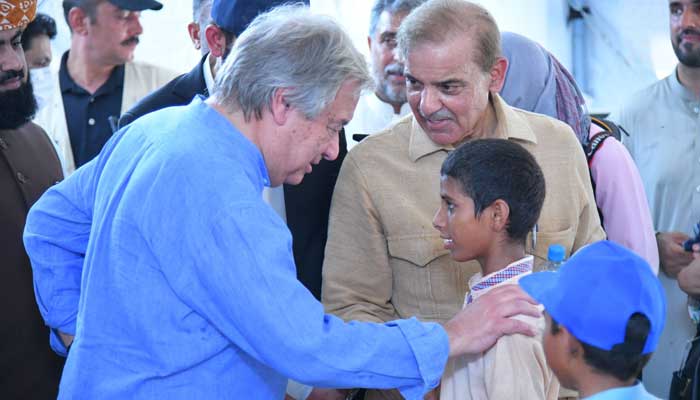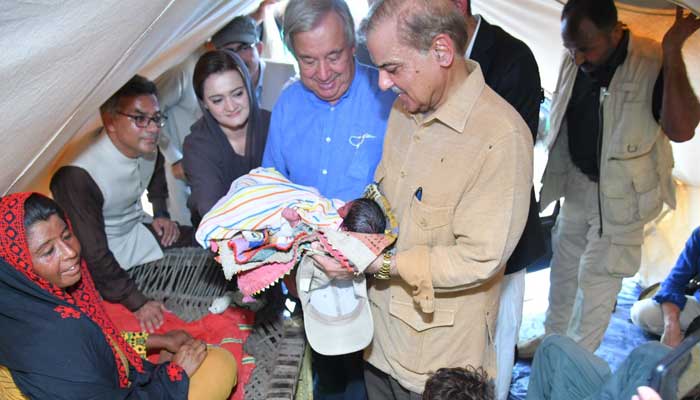‘Unimaginable’, UN chief remarks on scale of flood devastations in Pakistan
Reiterating his appeal for Pakistan, Guterres tells developed nations that UN's help is "a drop in the ocean"
SUKKUR: United Nations Secretary-General Antonio Guterres said Saturday that he has "never seen climate carnage" on such a scale as he toured parts of Pakistan hit by floods, blaming wealthier countries for the devastation.
Guterres has said he hopes his visit will galvanise support for Pakistan, which has put the provisional cost of the catastrophe at more than $30 billion, according to the government´s flood relief centre.
"I have seen many humanitarian disasters in the world, but I have never seen climate carnage on this scale," he said at a press conference in the port city of Karachi after witnessing the worst of the damage in southern Pakistan.
"I have simply no words to describe what I have seen today."
Pakistan receives heavy — often destructive — rains during its annual monsoon season, which is crucial for agriculture and water supplies.
But downpours as intense as this year's have not been seen for decades, while rapidly melting glaciers in the north have for months heaped pressure on waterways.
"Wealthier countries are morally responsible for helping developing countries like Pakistan to recover from disasters like this, and to adapt to build resilience to climate impacts that unfortunately will be repeated in the future," Guterres said, adding that G20 nations cause 80 percent of today´s emissions.
Pakistan is responsible for less than one percent of global greenhouse gas emissions, but is eighth on a list compiled by the NGO Germanwatch of countries most vulnerable to extreme weather caused by climate change.
'Insanity and suicide'
Around 33 million people have been affected by the floods, which have destroyed around two million homes and business premises, washed away 7,000 kilometres (4,300 miles) of roads and collapsed 500 bridges.
Guterres has lamented the lack of attention the world has given to climate change — particularly industrialised nations.
"This is insanity, this is collective suicide," he said after arriving in Pakistan on Friday.
The effect of the torrential rain has been twofold — destructive flash floods in rivers in the mountainous north, and a slow accumulation of water in the southern plains.
"All the children, men and women are roasting in this scorching heat. We have nothing to eat, there is no roof on our heads," Rozina Solangi, a 30-year-old housewife living in a displacement camp near Sukkur, told AFP on Friday.
"He must do something for us poor," she said of the UN chief´s visit.
The meteorological office said Pakistan has received five times more rain than normal in 2022. Padidan, a small town in Sindh province, has been drenched by more than 1.8 metres (71 inches) since the monsoon began in June.
Water levels have reached far higher in areas where rivers and lakes have burst their banks, creating dramatic inland seas.
Thousands of temporary campsites have mushroomed on slivers of high ground in the south and west — often roads and railway tracks in a landscape of water.
With people and livestock crammed together, the camps are ripe for outbreaks of disease, with many cases of mosquito-borne dengue reported, as well as scabies.
During his speedy tour, Guterres stopped at some of these makeshift camps and met with desperate flood victims, including a woman who gave birth overnight.
Wearing an Ajrak shawl with a traditional Sindhi block print, he later inspected the 4,500-year-old UNESCO world heritage site Mohenjo-daro, which has suffered water damage from the relentless monsoon rain.
Guterres terms floods "unimaginable"
Earlier today, the UN Secretary-General Guterres termed the devastations caused by the unprecedented floods "unimaginable" as he visited the affected areas in Sindh and Balochistan.
Antonio Guterres, accompanied by Prime Minister Shahbaz Sharif, Sindh Chief Minister Murad Ali Shah, Foreign Minister Bilawal Bhutto Zardari and others made an aerial visit to the flood-affected areas today.
On the scale of flood devastations in the country, he remarked "unimaginable".
Reiterating his appeal to help Pakistan cope with catastrophic floods, Antonio Guterres told the developed nations that the international body's help is "a drop in the ocean" compared to what is needed to rebuild.
Nearly 1,400 people have died in flooding that covers a third of the country — an area the size of the United Kingdom — wiping out crops and destroying homes, businesses, roads, and bridges.
Guterres hopes his visit will galvanise support for Pakistan, which needs at least $10 billion to repair damaged infrastructure.
The UNSG, in a conversation with journalists in Sukkur, said that there needs to be a serious discussion on loss and damages as "what the UN is doing in Pakistan is a drop in the ocean of what is needed".
"We are perfectly aware of our limited capacity and our resources. But you can absolutely be sure about one thing: were are in total solidarity with the Pakistani people."
The UN chief said that he will ask the international community to ensure that they help Pakistan "now" while vowing to raise awareness about the disastrous situation.
Pakistan receives heavy — often destructive — rains during its annual monsoon season, which is crucial for agriculture and water supplies.
But downpours as intense as this year's have not been seen for decades.
“It is not a matter of generosity, but a matter of justice,” he said, reiterating the UN’s commitment, strong support and solidarity with the flood-affected populace of Pakistan.
Guterres said that huge damages and losses were caused by the floods to human lives and properties.
He stressed that the international community must realise the serious impacts of greenhouse emissions as nature was striking back in the form of natural calamities.
Greenhouse gases have accelerated climate change and the nations with larger greenhouse emission footprints must understand these issues, Guterres added.
Pakistan expects to cut its GDP growth projection for the financial year 2022-2023 to 3% from 5% due to the losses, planning minister Ahsan Iqbal told an earlier news conference.
The United Nations has already launched an appeal for $160 million in aid to help Pakistan cope with the disaster.
In a tweet earlier, the UNSG said developing nations were paying a "horrific price" for the world's reliance on fossil fuels.
"Pakistan and other developing countries are paying a horrific price for the intransigence of big emitters that continue to bet on fossil fuels," Guterres said.
"From Islamabad, I am issuing a global appeal: Stop the madness. Invest in renewable energy now. End the war with nature."
-
Security forces gun down 30 terrorists in multiple IBOs in KP: ISPR
-
MQM-P calls for new province in Sindh
-
US report validates Pakistan military edge over India: PM
-
Banned TTP poses serious threat to Pakistan security: UNSC panel
-
CM Afridi clarifies remarks on by-poll after ECP requests army deployment
-
Dubai sees 3.2m Pakistani passengers in 2025 as airport sets new milestone
-
Security forces kill 23 Indian proxy terrorists in KP's Kurram
-
Pakistan to construct island to boost oil exploration: report
















